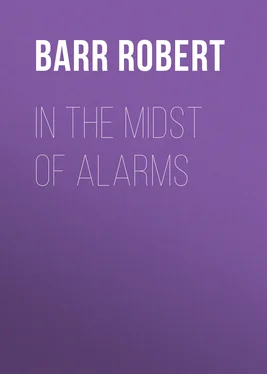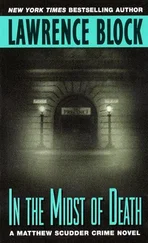Robert Barr - In the Midst of Alarms
Здесь есть возможность читать онлайн «Robert Barr - In the Midst of Alarms» — ознакомительный отрывок электронной книги совершенно бесплатно, а после прочтения отрывка купить полную версию. В некоторых случаях можно слушать аудио, скачать через торрент в формате fb2 и присутствует краткое содержание. Жанр: foreign_prose, foreign_antique, на английском языке. Описание произведения, (предисловие) а так же отзывы посетителей доступны на портале библиотеки ЛибКат.
- Название:In the Midst of Alarms
- Автор:
- Жанр:
- Год:неизвестен
- ISBN:нет данных
- Рейтинг книги:4 / 5. Голосов: 1
-
Избранное:Добавить в избранное
- Отзывы:
-
Ваша оценка:
- 80
- 1
- 2
- 3
- 4
- 5
In the Midst of Alarms: краткое содержание, описание и аннотация
Предлагаем к чтению аннотацию, описание, краткое содержание или предисловие (зависит от того, что написал сам автор книги «In the Midst of Alarms»). Если вы не нашли необходимую информацию о книге — напишите в комментариях, мы постараемся отыскать её.
In the Midst of Alarms — читать онлайн ознакомительный отрывок
Ниже представлен текст книги, разбитый по страницам. Система сохранения места последней прочитанной страницы, позволяет с удобством читать онлайн бесплатно книгу «In the Midst of Alarms», без необходимости каждый раз заново искать на чём Вы остановились. Поставьте закладку, и сможете в любой момент перейти на страницу, на которой закончили чтение.
Интервал:
Закладка:
After the meal they all adjourned to the veranda, where the air was cool and the view extensive. Mrs. Bartlett would not hear of the young men pitching the tent that night. “Goodness knows, you will have enough of it, with the rain and the mosquitoes. We have plenty of room here, and you will have one comfortable night on the Ridge, at any rate. Then in the morning you can find a place in the woods to suit you, and my boy will take an ax and cut stakes for you, and help to put up your precious tent. Only remember that when it rains you are to come to the house, or you will catch your deaths with cold and rheumatism. It will be very nice till the novelty wears off; then you are quite welcome to the front rooms upstairs, and Hiram can take the tent back to Erie the first time he goes to town.”
Mrs. Bartlett had a way of taking things for granted. It never seemed to occur to her that any of her rulings might be questioned. Hiram sat gazing silently at the road, as if all this was no affair of his.
Yates had refused a chair, and sat on the edge of the veranda, with his back against one of the pillars, in such a position that he might, without turning his head, look through the open doorway into the room. where Miss Bartlett was busily but silently clearing away the tea things. The young man caught fleeting glimpses of her as she moved airily about her work. He drew a cigar from his case, cut off the end with his knife, and lit a match on the sole of his boot, doing this with an easy automatic familiarity that required no attention on his part; all of which aroused the respectful envy of young Hiram, who sat on a wooden chair, leaning forward, eagerly watching the man from New York.
“Have a cigar?” said Yates, offering the case to young Hiram.
“No, no; thank you,” gasped the boy, aghast at the reckless audacity of the proposal.
“What’s that?” cried Mrs. Bartlett. Although she was talking volubly to the professor, her maternal vigilance never even nodded, much less slept. “A cigar? Not likely! I’ll say this for my husband and my boy: that, whatever else they may have done, they have never smoked nor touched a drop of liquor since I’ve known them, and, please God, they never will.”
“Oh, I guess it wouldn’t hurt them,” said Yates, with a lack of tact that was not habitual. He fell several degrees in the estimation of his hostess.
“Hurt ‘em?” cried Mrs. Bartlett indignantly. “I guess it won’t get a chance to.” She turned to the professor, who was a good listener—respectful and deferential, with little to say for himself. She rocked gently to and fro as she talked.
Her husband sat unbendingly silent, in a sphinxlike attitude that gave no outward indication of his mental uneasiness. He was thinking gloomily that it would be just his luck to meet Mrs. Bartlett unexpectedly in the streets of Fort Erie on one of those rare occasions when he was enjoying the pleasures of sin for a season. He had the most pessimistic forebodings of what the future might have in store for him. Sometimes, when neighbors or customers “treated” him in the village, and he felt he had taken all the whisky that cloves would conceal, he took a five-cent cigar instead of a drink. He did not particularly like the smoking of it, but there was a certain devil-may-care recklessness in going down the street with a lighted cigar in his teeth, which had all the more fascination for him because of its manifest danger. He felt at these times that he was going the pace, and that it is well our women do not know of all the wickedness there is in this world. He did not fear that any neighbor might tell his wife, for there were depths to which no person could convince Mrs. Bartlett he would descend. But he thought with horror of some combination of circumstances that might bring his wife to town unknown to him on a day when he indulged. He pictured, with a shudder, meeting her unexpectedly on the uncertain plank sidewalk of Fort Erie, he smoking a cigar. When this nightmare presented itself to him, he resolved never to touch a cigar again; but he well knew that the best resolutions fade away if a man is excited with two or three glasses of liquor.
When Mrs. Bartlett resumed conversation with the professor, Yates looked up at young Hiram and winked. The boy flushed with pleasure under the comprehensiveness of that wink. It included him in the attractive halo of crime that enveloped the fascinating personality of the man from New York. It seemed to say:
“That’s all right, but we are men of the world. We know.”
Young Hiram’s devotion to the Goddess Nicotine had never reached the altitude of a cigar. He had surreptitiously smoked a pipe in a secluded corner behind the barn in days when his father was away. He feared both his father and his mother, and so was in an even more embarrassing situation than old Hiram himself. He had worked gradually up to tobacco by smoking cigarettes of cane made from abandoned hoop-skirts. Crinoline was fashionable, even in the country, in those days, and ribs of cane were used before the metallic distenders of dresses came in. One hoop-skirt, whose usefulness as an article of adornment was gone, would furnish delight and smoking material for a company of boys for a month. The cane smoke made the tongue rather raw, but the wickedness was undeniable. Yates’ wink seemed to recognize young Hiram as a comrade worthy to offer incense at the shrine, and the boy was a firm friend of Yates from the moment the eyelid of the latter drooped.
The tea things having been cleared away, Yates got no more glimpses of the girl through the open door. He rose from his lowly seat and strolled toward the gate, with his hands in his pockets. He remembered that he had forgotten something, and cudgeled his brains to make out what it was. He gazed down the road at the house of the Howards, which naturally brought to his recollection his meeting with the young girl on the road. There was a pang of discomfiture in this thought when he remembered the accomplishments attributed to her by Mrs. Bartlett. He recalled his condescending tone to her, and recollected his anxiety about the jar. The jar! That was what he had forgotten. He flashed a glance at old Hiram, and noted that the farmer was looking at him with something like reproach in his eyes. Yates moved his head almost imperceptibly toward the barn, and the farmer’s eyes dropped to the floor of the veranda. The young man nonchalantly strolled past the end of the house.
“I guess I’ll go to look after the horses,” said the farmer, rising.
“The horses are all right, father. I saw to them,” put in his son, but the old man frowned him down, and slouched around the corner of the house. Mrs. Bartlett was too busy talking to the professor to notice. So good a listener did not fall to her lot every day.
“Here’s looking at you,” said Yates, strolling into the barn, taking a telescopic metal cup from his pocket, and clinking it into receptive shape by a jerk of the hand. He offered the now elongated cup to Hiram, who declined any such modern improvement.
“Help yourself in that thing. The jug’s good enough for me.”
“Three fingers” of the liquid gurgled out into the patented vessel, and the farmer took the jar, after a furtive look over his shoulder.
“Well, here’s luck.” The newspaper man tossed off the potion with the facility of long experience, shutting up the dish with his thumb and finger, as if it were a metallic opera hat.
The farmer drank silently from the jar itself. Then he smote in the cork with his open palm.
“Better bury it in the wheat bin,” he said morosely. “The boy might find it if you put it among the oats—feedin’ the horses, ye know.”
“Mighty good place,” assented Yates, as the golden grain flowed in a wave over the submerged jar. “I say, old man, you know the spot; you’ve been here before.”
Читать дальшеИнтервал:
Закладка:
Похожие книги на «In the Midst of Alarms»
Представляем Вашему вниманию похожие книги на «In the Midst of Alarms» списком для выбора. Мы отобрали схожую по названию и смыслу литературу в надежде предоставить читателям больше вариантов отыскать новые, интересные, ещё непрочитанные произведения.
Обсуждение, отзывы о книге «In the Midst of Alarms» и просто собственные мнения читателей. Оставьте ваши комментарии, напишите, что Вы думаете о произведении, его смысле или главных героях. Укажите что конкретно понравилось, а что нет, и почему Вы так считаете.












